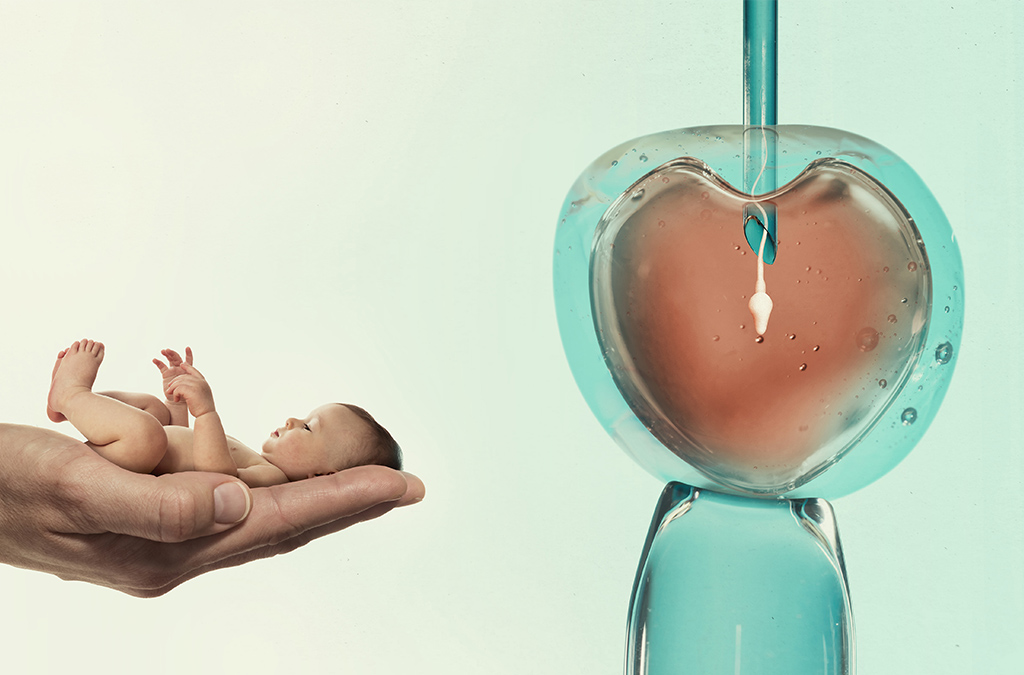Polycystic Ovary Syndrome (PCOS) Treatment in Pune

Overview
Polycystic ovary syndrome (PCOS) is a common situation that affects how a female’s ovaries work.
Features of PCOS
- Uneven periods – which mean your ovaries do not periodically discharge eggs.
- Additional androgen – high intensities of masculine hormones in your body, which may cause physical marks such as extra facial or body hair
- Polycystic ovaries – your ovaries become inflamed and comprise many fluid-filled pouches that surround the eggs.
If you have at least any two of these features, you may be spotted with PCOS and should take PCOS treatment in Pune.
Everything You Need to Know About Polycystic Ovary Syndrome
Polycystic Ovaries | Symptoms | Causes | Diagnosed | Treatments | Complication | Weight Gain | Pregnancy | Diet and Lifestyle
Polycystic ovaries
Polycystic ovaries contain many harmless cavities that are up to 8mm in size. The cavities are immature pouches in which eggs mature. In PCOS, these pouches are often impotent to release an egg, which means ovulation does not take place. It’s hard to know exactly how many females have PCOS, but it’s thought to be very communal, affecting about 1 in every ten females.
Symptoms of polycystic ovary syndrome (PCOS)
- Uneven periods or no periods at all
- Trouble in getting pregnant as a result of uneven ovulation or failure to ovulate
- Unnecessary hair growth, typically on the face, chest, back, or buttocks
- Weight increase
- Weakening hair and hair loss from the crown
- Oily skin or spots
Causes of polycystic ovary syndrome (PCOS)
Resistance to insulin
Insulin is a hormone formed by the pancreas to control the quantity of sugar in the blood. It supports to move of glucose from the blood into cells, where it’s fragmented down to produce energy.
Insulin resistance means the body’s tissues are resilient to the effects of insulin. Hence the body has to create extra insulin to compensate. In addition, the elevation of insulin causes the ovaries to create too much testosterone, which inhibits the sacs’ development and normal ovulation. Insulin resistance can also lead to overweight, making PCOS indications worse, as having additional fat causes the body to yield even more insulin.
Hormone disproportion
Many females with PCOS are found to have a disproportion in certain hormones, including:
- Elevated testosterone levels – a hormone often assumed as a male hormone, although all females usually produce minor amounts of it.
- Elevated levels of luteinizing hormone (LH) – this excites ovulation but may have an irregular effect on the ovaries if levels are too tall.
- Lower levels of sex hormone-binding globulin (SHBG) – a protein in the blood that fixes to testosterone and decreases its effect
- Elevated levels of prolactin (only in certain females with PCOS) – a hormone that arouses the breast glands to create milk in pregnancy
The precise reason why these hormonal variations occur is not known. However, it’s been recommended that the problem might start in the ovary itself.
Genetics
PCOS occasionally runs in relations. Therefore, if any relations, such as your mother, sister, or aunt, have PCOS, the risk of you emerging is often improved.
This proposes there may be a hereditary link to PCOS, although exact genes related to the disorder have not yet been identified.
12+ Years of Experience as
Sexologist and Infertility Specialist
12+ Years of Experience as
Sexologist and Infertility Specialist
Call Us
+91 - 8447746247
How PCOS is diagnosed
There’s no examination to analyze PCOS. Instead, your physician is likely to start with a conversation about your clinical history, counting your menstrual phases and body weight changes. Next, a physical examination will include checking for symptoms like excess hair growth, insulin confrontation, and skin condition.
Your physician might then recommend:
- A pelvic examination: The physician visually and physically reviews your reproductive body part for masses, developments, or other irregularities.
- Blood tests: Your blood may be examined to measure hormone intensities. This analysis can exclude good causes of menstrual irregularities or androgen excess that simulates PCOS. In addition, you might have another blood test to calculate the amount of glucose tolerance and fasting cholesterol and triglyceride intensities.
- Ultrasound testing:Your physician checks the presence of your ovaries and the depth of the lining of your uterus. A transducer is placed in your vagina. This transducer produces sound waves interpreted into images on a computer screen.
Treatments for PCOS
PCOS treatment in Pune at Nakshatra IVF Clinic concentrates on handling your specific concerns, such as sterility, acne, or overweight. Precise treatment might include lifestyle variations or treatment.
Lifestyle changes
Your physician may endorse weight loss through a low-calorie food combined with enough exercise. Even a modest decrease in you might recover your condition. Weight loss may also increase the efficiency of medications your physician endorses for PCOS and can help with sterility.
Medications
To control your menstrual cycle, your physician might recommend:
- Combination of birth control drugs: Drugs that contain estrogen and progestin reduce androgen production and control estrogen. Controlling your hormones can lower your threat of endometrial cancer and spot-on abnormal bleeding, excess hair development, and spots.
- Progestin treatment: Taking progestin for 10 to 14 days each in one to two months can normalize your periods and guard against endometrial cancer. However, progestin treatment doesn’t advance androgen levels and won’t avoid pregnancy.
To support ovulation, your physician might recommend:
- Clomiphene: This oral anti-estrogen pill is taken during the initial days of your menstrual cycle.
- Letrozole: This breast tumour treatment can work to excite the ovaries.
- Metformin: This oral pill for type 2 diabetes recovers insulin resistance and depresses insulin levels. If you have prediabetes, metformin can help to slow the development to type 2 diabetes and help to reduce weight.
To reduce unwanted hair growth, your doctor might recommend:
- Birth control medications: These medicines reduce androgen production that can cause unnecessary hair growth.
- Spironolactone: This medicine blocks the action of androgen on the skin. Spironolactone can cause birth imperfections, so effective contraception is compulsory while taking this medication. It isn’t suggested if you’re pregnant or planning to achieve pregnancy.
- Eflornithine: This ointment can slow unwanted facial hair growth in females.
- Electrolysis: A minute needle is introduced into each hair follicle. The needle produces a pulse of electrical current to damage and finally destroy the follicle.
Complication of PCOS
Women with PCOS have a higher risk of developing some significant health issues. Type 2 diabetes, hypertension, heart and blood vessel issues, and uterine cancer are only a few of them. In addition, PCOS affects the ability of many women to conceive (fertility).
PCOS and Weight gain
PCOS makes it harder for the body to utilize the hormone insulin, which aids in the conversion of carbohydrates and starches from meals into energy. Insulin and sugar (glucose) can build up in the bloodstream due to this disease, known as insulin resistance.
High insulin levels increase the production of male hormones known as androgens. Body hair growth, acne, irregular periods, and weight gain are signs of elevated androgen levels. The weight gain is usually in the abdomen since male hormones induce it. Men tend to put on weight in this area. Women with PCOS have an apple-shaped body rather than a pear-shaped one.
The most harmful form of fat is abdominal fat. This is because it has been linked to an increased risk of heart disease and other illnesses.
PCOS and Pregnancy
Women with the polycystic ovarian syndrome (PCOS) are more likely to experience specific issues or difficulties during pregnancy. Unfortunately, some women may not be aware that they have PCOS until they try to get pregnant. As a result, PCOS frequently remains unnoticed until a woman becomes pregnant. However, if you’ve been trying to conceive naturally for more than a year, talk to your doctor about being tested.
Your doctor can assist you in making a pregnancy plan. In addition, some techniques, like reducing weight, eating a nutritious diet, and, in some circumstances, using medicines, can help you get pregnant.
Pregnancy and delivery problems are more likely in women with PCOS. These include a three-fold increased risk of miscarriage in early PCOS pregnancy compared to women without PCOS, gestational diabetes (diabetes during pregnancy), which can result in large babies, preeclampsia (suddenly elevated blood pressure and body swelling after the 20th week of pregnancy), preterm birth, and C-section delivery.
Preeclampsia can harm the mother’s kidneys, liver, and brain, so you’ll need to be constantly examined if you get it throughout your pregnancy.
Diet and Lifestyle during PCOS treatment in Pune
To help reduce the symptoms of PCOS, consider the following:
- Maintain a healthy body mass index (BMI): Weight loss can help restore ovulation by lowering insulin and testosterone levels. Consult your doctor about a weight-loss program, and visit with a nutritionist regularly for assistance in achieving your weight-loss objectives.
- Carbohydrates should be limited: Insulin levels may be raised by low-fat, high-carbohydrate diets. If you have PCOS, talk to your doctor about a low-carbohydrate diet. Choose complex carbs, which take longer to boost your blood sugar levels.
- Take part in activities: Exercise aids in the reduction of blood sugar levels. If you have PCOS, increasing your daily activity and engaging in a regular exercise program can help you manage your weight and avoid diabetes by treating or perhaps preventing insulin resistance.
Related Conditions
Patient Testimonials
It’s always the word of mouth that’s the best advice

Goral Gondnale
Being a doctor myself, I was looking for a Gynaecologist who understands my concerns and solves it so easily that my non-doctor husband understands it well. Dr. Ramit is very compassionate and is really good at his skills. I would highly recommend him.

Pravin Bhanvase
Doctor is very friendly & attentive. Listens to you gives you plenty of time. one stop solutions for all diagnostics. All the test samples are collected at clinic only, Dr. Ramit Kamte is very compassionate and is really good at his skills. I would highly recommend him.
Google Written Reviews

5/5
Dr. Ramit Raosaheb Kamate
MBBS ,DNB, DGO, FRM (UK)
Dr. Ramit Kamate is a Reproductive Medicine Consultant and Sexologist with experience of 12+ years. He specialises in Sexual Medicine for male and female, Fertility Treatment, Pre and Post Delivery Care, Normal Vaginal Delivery (NVD), Tubectomy/Tubal Ligation, Natural Cycle IVF, MTP.
Dr. Ramit Kamate finished MBBS from B J Medical College, Pune. He pursued Masters’s In Reproductive Medicine from Hamilton University, UK & IBCME Dubai. Completed Fellowship in Cosmetic Gynaecology and Sexual Medicine from USA.
My Achievements
MBBS DGO DNB Gold Medalist
Fellow In Sexual Medicine (USA)
Fellow In Reproductive Medicine
Fellow In Cosmetic Gynecology (USA)
Fellow In Ultrasound And Laparoscopy
Fellow In Stem Cell Medicine
Patient Guide
Along with treating our patients, we also guide them with the help of our educational blogs and videos.
Educational Blogs

10 Foods to Improve Female Egg Quality
From anticipation and eagerness to unease, the IVF journey sure is a roller-coaster of emotions. The clinic you choose to guide you through this process plays a vital role in your overall experience and potential for success. Thus, it is essential to carefully consider various criteria when selecting any IVF or infertility clinics in Pune.

7 Key Factors to Consider When Choosing an IVF Clinic
From anticipation and eagerness to unease, the IVF journey sure is a roller-coaster of emotions. The clinic you choose to guide you through this process plays a vital role in your overall experience and potential for success. Thus, it is essential to carefully consider various criteria when selecting any IVF or infertility clinics in Pune.

How Health Conditions like Diabetes to Thyroid Disorders Impacts Fertility
Masturbation is a common and natural practice among all genders. But there is a concern that it might lead to premature ejaculation. While this claim has been discussed among professionals, several individuals still wonder if there is a connection between these two.
Educational Videos

15 Foods To Avoid When Pregnant
Pregnancy के दौरान diet बहुत important है। हर महिला को अपने diet पर ध्यान देना चाहिए और कुछ ऐसे खाद्य पदार्थ है जो नहीं खाने चाहिए (Pregnancy diet)। आज इस video में डॉ Ramit Kamate बताते है की pregnancy के दौरान कोन से food items नहीं खाने चाहिए।

शीघ्रपतन का इलाज
जब patient हमारे पास आता है और उसे Premature Ejaculation की समस्या होती है तो हम कुछ tests करते है जैसे blood tests, sonography of penis और doppler of penis।

Hymen क्या होता है?
Hymen एक thin membrane है जो vaginal opening पर मौजूद होती है। ये अक्सर first time sexual intercourse करने पर फट जाती है और bleeding हो सकती है।






